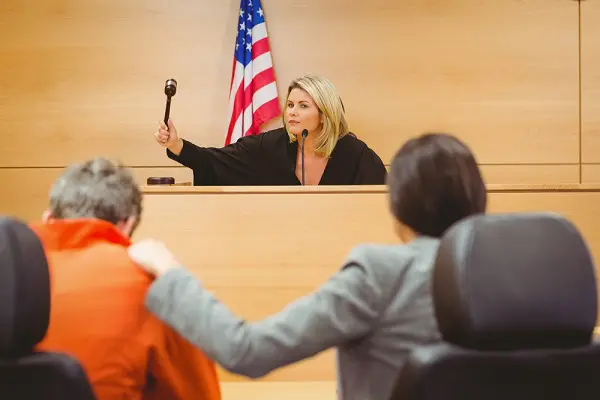
Have you been charged with a felony or misdemeanor in Houston? If so, you and your family probably have a lot of questions and concerns about the legal process you face.
At the law offices of Houston Criminal Defense Attorney Lisa Shapiro Strauss, we’ve been helping clients navigate the criminal justice system in Houston for 30 years. One of the ways we help our clients is by educating them about the legal process and answering any questions they may have.
Here are some of the most common questions our clients ask:
On This Page
What Should I Do after I’ve Been Arrested?
Cooperate with the arresting officers; there’s no need to be rude. However, remember that you have a right to remain silent (any statement you make could be used against you), consult with an attorney, and have an attorney present during questioning.
Often when police question a suspect, it is because they don’t have enough evidence to make a case and are hoping the suspect will make an incriminating statement. By saying nothing without an attorney present, you reduce the chance of helping them make a case against you.
What Happens at an Arraignment?
After you have been arrested, your first court appearance will be at an arraignment proceeding. This is where the court formally charges you with the crimes they believe you have committed. You will be asked to enter a plea in response to the charges: guilty, not guilty, or no contest.
Depending on the charges filed against you, the judge will determine the amount of bail you will be required to post in order to be released from jail.
What is Bail?
Bail is the amount of money or some form of property the court requires in order to secure the conditional release of a suspect after they have been arrested and charged with a crime. Bail allows the defendant temporary freedom to prepare their court case; the conditions imposed by the court are designed ensure to the suspect will return for their trial and required court appearances.
The amount of bail can depend on a lot of factors. (Is the defendant a flight risk, are they likely to commit another crime, etc.) In extreme cases, such as capital murder, the judge may refuse to grant bail.
Many times, a criminal defense lawyer can work with the court to lower the amount of your bail amount.
What Goes on at the Preliminary Hearings?
Preliminary hearings or proceedings may be described as the trial before the trial. The purpose of preliminary hearings is not to decide your guilt or innocence, but to determine if the prosecutor has enough evidence to justify further criminal proceedings against you. These preliminary proceedings also give your attorney the opportunity to examine the case against you and develop an effective defense strategy.
Preliminary proceedings in Texas can include:
- Bail/Bond hearings that determine the conditions and rules you must follow in order to post bail
- Suppression hearings that determine if the evidence against you is admissible in court
- Plea negotiations, during which your criminal defense attorney will try to negotiate a plea bargain or similar deal on your behalf.
- Discovery, where information about your case is exchanged between the prosecutor and your lawyer.
What Happens at the Trial?
Once the preliminary proceedings are completed, if the prosecutor still intends to pursue charges against you, a trial date will be set. Depending on the circumstances in your case, you may wish to plead guilty, request a jury trial or request a trial by judge. Your criminal defense lawyer will be able to advise you on the best option to choose.
There can be three phases to your trial:
Jury Selection: The process of seating unbiased jurors who will fairly evaluate the evidence that is presented. There are six jurors in misdemeanor cases and 12 in felony cases jurors.
Guilt/Innocence Phase: Opening statements are made. The state will attempt to prove that you are guilty of the crimes you have been charged with. Your defense attorney will cross examine the state’s witnesses and present a defense of the charges against you. Both sides will make a closing statement.
When both side have finished presenting their cases, the judge and/or jury will deliberate the case and then deliver a verdict. In Texas, the jury’s verdict must be unanimous in order to convict you. A mistrial is declared if a unanimous vote can’t be reached. If the jury reaches a unanimous vote of guilty, then the sentencing or punishment phase of the trial commences.
Punishment/Sentencing phase: If you have been found guilty, the judge and/or jury will determine your punishment. Depending on the severity of charges, this can include parole, fines and jail time.
Can I Appeal the Verdict?
If you have been found guilty, you generally have a right to appeal the conviction. Giving up the right to appeal may be a condition of a plea bargain or other agreement with the State.
What are the Consequences of a Guilty Verdict?
There are many consequences to a guilty verdict in addition to jail time or fines, depending on the nature of the charges against you. A guilty verdict can make it hard to find a job or get government assistance. You may lose the right to vote, own a firearm or hold a driver’s license. You may also lose any professional licenses you have been issued. A conviction may be used against you in a divorce or custody case.
Houston Criminal Defense Lawyer Lisa Shapiro Strauss is Here to Answer Your Questions
If you have questions that pertain to a pending case against, please do not hesitate to call Houston criminal defense attorney Lisa Shapiro Strauss at (713) 449-9922 to schedule a free consultation. We will sit down and review the facts in your case, answer any questions you might have and provide sound, professional advice on the best way to move forward with your case.




